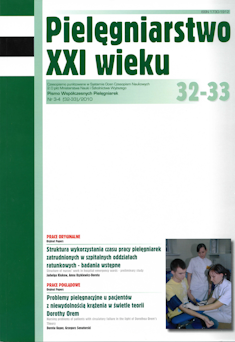Sense of coherence and social support for women in confinement
Keywords:
confinement, sense of coherence, social supportAbstract
Aim: Correlation between the level of coherence and social support to women in delivery period.
Material and methodology: The research comprised a group of 160 women in the period between 4 – 6th week of confinement. The research methods used included diagnostic survey and a questionnaire was used as a research tool. The questionnaire was prepared by the author based on Social Support Survey Questionnaire and the Polish adaptation of Life Orientation Questionnaire SOC-29
Results. The research comparing the levels of coherence among women with support they received, show that information support had no influence on the level of their sense of coherence. Instrumental support, in turn did have influence on the sense of coherence in the examined group. Women with high level of coherence seldom need financial support and can, to a greater extent use assistance with daily home chores and working with childcare. A higher level of coherence could also be observed in women receiving more evaluative and emotional support for the people closest to them. Emotional support from social midwife had no influence on examined women.
Conclusions. The greatest informational support was granted to women by community care midwives and midwives working in hospitals. The groups that were less frequently pointed included: medical doctor, family members, friends. Supportive role of family during confinement was confirmed in the areas of evaluative and emotional support. Also, the level of education and life in a stable relationship had influence on the level of coherence. Most individuals with low level of sense of coherence declared a necessity for instrumental support in the form of financial assistance.
References
1. Łuszczyńska-Cieślak A. Czym jest dla psychologa poczucie koherencji? Promocja Zdrowia. Nauki Społeczne i Medycyna; 2001; 8, (20): 56 - 68.
2. Antonovsky A. Poczucie koherencji jako determinanta zdrowia. [w]: Psychologia Zdrowia. Heszen-Niejodek I. Sęk H. red. PWN. Warszawa; 1997, 206 - 231.
3. Tobiasz-Adamczyk B. Wybrane elementy socjologii zdrowia i choroby. Wydawnictwo Uniwersytetu Jagiellońskiego. Kraków; 2000.
4. Antonovsky A. Rozwikłanie tajemnicy zdrowia. Jak radzić sobie ze stresem i nie zachorować. Fundacja Instytutu Psychiatrii i Neurologii. Warszawa; 2005.
5. Sęk H., Cieślak R. Wsparcie społeczne – sposoby definiowania, rodzaje i źródła wsparcia, wybrane koncepcje teoretyczne. [w]: Wsparcie społeczne, stres i zdrowie. Sęk H., Cieślak R. red. PWN. Warszawa; 2005. 11 – 28 (b).
6. Kmiecik-Baran K. Skala wsparcia społecznego. Teoria i właściwości psychometryczne. Przegląd Psychologiczny 1995; 38 (1/2), 201 - 214.
7. Koniarek J. i wsp., Kwestionariusz Orientacji Życiowej. Adaptacja The Sense of Coherence Questionnaire (SOC) A. Antonovsky’ego. Przegląd Psychologiczny 1993. (36) 491 - 502.
8. Mroziak B., Czabała J., Wójtowicz S. Poczucie koherencji a zaburzenia psychiczne, Psychiatria Polska 1997; 3 (31), 257 - 268.
Downloads
Published
Issue
Section
License
Copyright (c) 2010 Authors

This work is licensed under a Creative Commons Attribution 4.0 International License.




